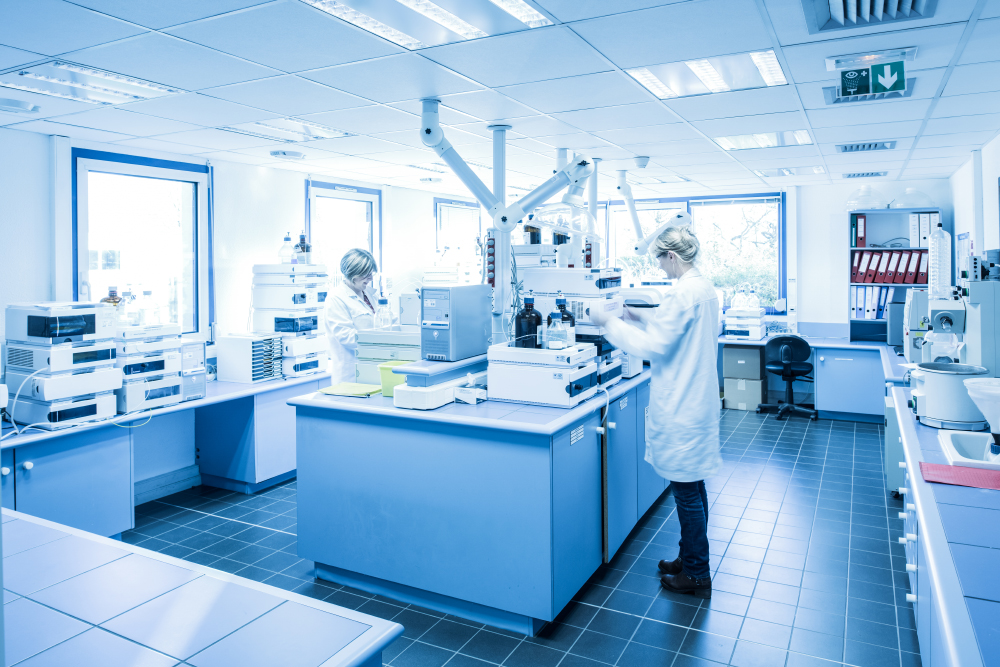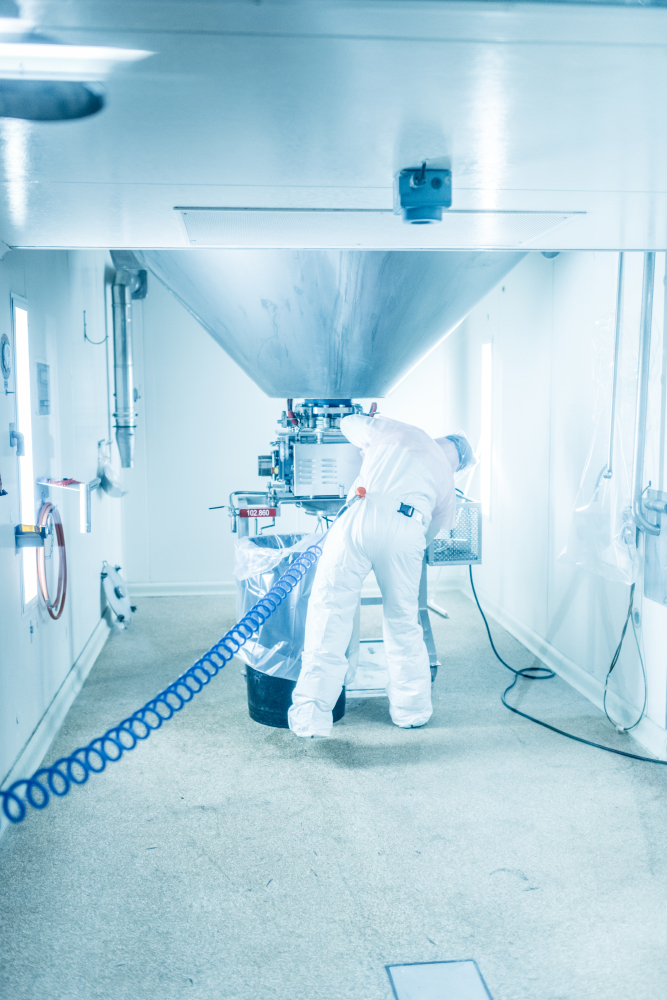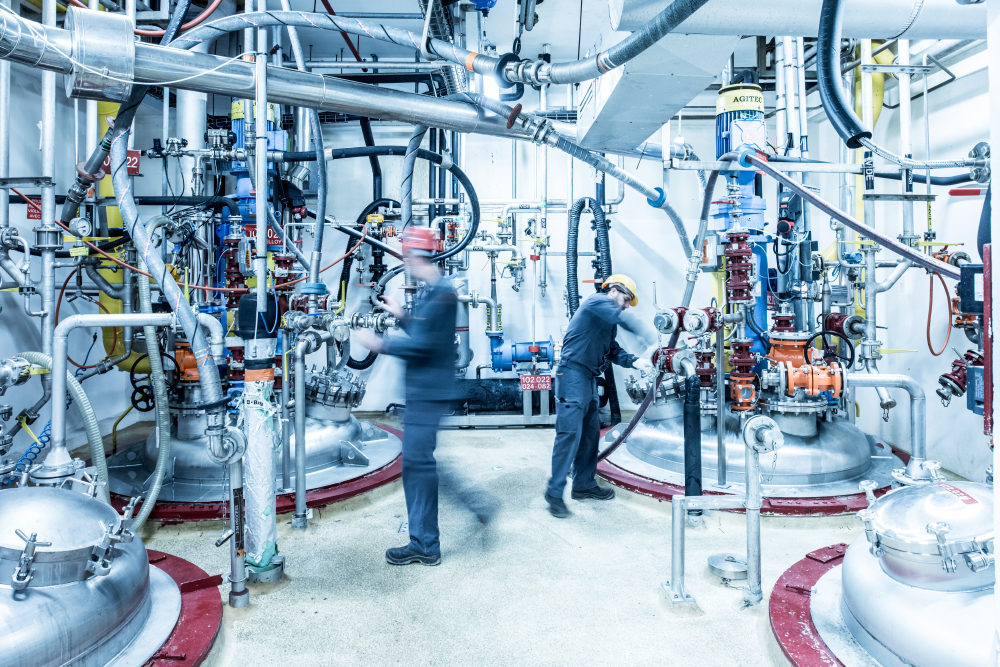The Lean method at the heart of operations transformation at Siegfried
For the Saint-Vulbas site, which has experienced significant growth in recent years, Siegfried chose to collaborate with the Onepoint group to launch an ambitious transformation project towards a culture of continuous improvement.
Siegfried, a key player in the pharmaceutical chemistry sector.
A pioneer in advanced science and technology for over 150 years, Siegfried scales its clients’ innovations to industrial levels, manufacturing health products for patients around the world.
Convinced that Operational Excellence and Lean Management are key drivers for optimizing the industrial performance of its site, Philippe Moy, Site Director at Saint-Vulbas, supported by Gregory Dutoit, Multi Site & Operational Excellence Head for the Group’s Drug Substances activities, called on the expertise of the Onepoint group to launch an ambitious and long-term transformation project towards a sustained culture of continuous improvement.
The Saint-Vulbas site has experienced strong growth in recent years, driven by the strong commitment of its employees. However, to sustain this growth, it became essential to introduce more structured approaches. In this regard, the solution proposed by the Onepoint group, as part of an operational excellence approach, immediately caught our attention.
A deep transformation of the site’s operating methods
From the very first discussions in January 2024 with the site’s management team, we were quickly convinced by the enthusiasm generated by this in-depth transformation of the site’s operating methods. The awareness of the need for change and the benefits brought by Onepoint group’s approach was the catalyst for the project’s success.
The teams were aligned on the need to shift towards more collaborative and less siloed ways of working.



The objective of this approach is multifaceted: to sustain our high level of activity, to improve productivity, and to make our processes and working methods more robust. It is also designed to foster a greater sense of ease and well-being at work for all our employees.
A tailor-made support program
With the support of the site’s management and sponsorship from the Industrial Management team, we proposed a dual-approach strategy.
- One financial component aimed at generating measurable gains with immediate impact on the income statement,
- And one cultural component designed to deeply embed continuous improvement reflexes and the discipline they require.
The identified gains made the investment in Onepoint group’s support profitable, achieving a 3-to-1 return over 12 months (three euros in financial gains for every euro spent on consulting, verified 12 months after the project launch).
The business case was made possible following a thorough industrial diagnosis. To kick off the initiative, five pilot projects were launched over a 12-week period. Among these, a balance was struck between financial performance projects (2) and foundational projects aimed at establishing the basics of industrial performance (3).
A process driven by a structured approach
This marked the start of our first “Rhythm”: a Rhythm is a 12-week period during which 4 to 6 issues are tackled simultaneously using Lean methods. The goals of these projects are ambitious: improve productivity and industrial performance, reduce site costs, free up capacity margins, and thereby increase revenue.
All while shifting behaviors and fostering a performance-driven culture grounded in continuous improvement.
Each project, known as a LEAN project, follows a consistent structure: a cross-functional team supported by an executive sponsor from the management committee, the use of Lean methodology, a 12-week schedule, and weekly monitoring using visual management tools.
Onepoint group brought us both technical expertise in OPEX methods and tools (DMAIC, 5S, AIC) and strong support in the implementation and management of the projects.
The consultants quickly grasped the specifics of our operations and contributed real added value: in the 5S projects, by introducing a broader, more insightful perspective we hadn’t considered to improve organization; and in the DMAIC projects, by challenging us to dig deeper into root cause analysis.
This quickly demonstrated the effectiveness of the approach and helped motivate others to get involved in the projects.
Sustaining the Lean culture through a training cycle
In parallel with the projects, and to make the site’s management autonomous in leading future initiatives and applying Lean methods, we rolled out a Lean training program. This included a Green Belt-level Lean training course and a coaching system for the key players driving the company’s transformation.
This effort ensures a deep understanding of the concepts implemented in the LEAN projects, helping to secure the long-term sustainability of both the approach and the culture beyond our involvement.
As an OpEx Lead, the human-centered approach has been extremely valuable in analyzing the root causes of performance gaps and sustaining improvements through audits. People are not the problem — it’s about understanding why instructions are sometimes not followed. These Lean reflexes, developed through coaching, have become a major asset in my current role.
To ensure sustained progress, a tight management system was implemented: each week, the Site Director and the OpEx Manager (LEAN Champion) meet with us to review the progress of the initiative, anticipate potential risks, monitor performance indicators, and track the advancement of the projects.
Additionally, a monthly steering committee presents the results achieved, ensures that the identified actions will deliver the expected economic gains, and confirms that the shift in operating methods is becoming part of everyone’s daily routine.
At the end of each 12-week Rhythm, a formal review is conducted. During this review, managers validate their Green Belt certification, and the financial controller confirms the economic outcomes. A new wave of LEAN projects is then launched to continue the transformation.
A momentum that keeps growing
Over the course of a year, 15 LEAN projects have been carried out, involving 100% of the management team and over half of the site’s employees. More than 800 improvement actions have been implemented by teams on the ground, exceeding the initial financial and operational targets — and the momentum continues in 2025.
New management routines and Lean reflexes are becoming part of the daily practices of both leadership and teams. Employees remain engaged, and the drive to sustain the improvements already achieved is well underway.
I was immediately convinced and fully committed to the approach. This drive, combined with the energy and dedication of the consultants, allowed us to face minimal resistance to change and to achieve significant results across all projects in a short amount of time.
In parallel, we are supporting the site’s management in developing their 5-year strategy, with the aim of fully aligning on-site projects, defining a clear and shared direction, and prioritizing investments.
We conduct an annual assessment and follow-up of the site’s industrial maturity, and soon, of its Lean maturity level, to ensure a level of autonomy that enables the continuation of the transformation over the long term.
Structured routines punctuate the year, providing rhythm and preventing tunnel vision. They help keep the leadership team in a dual mindset: acting on day-to-day priorities while regularly stepping back to maintain a long-term strategic focus.
With one year of hindsight, we can clearly see the value brought by our partners at Onepoint group, both in terms of cultural transformation and economic results.
The success we are experiencing today in implementing this continuous improvement approach is the result of both the strong commitment of our teams and the high-quality support provided by Onepoint group — both in terms of methodology and human engagement.
The consultants’ dedication has been outstanding; they are fully integrated into the various projects and have become an essential part of the team dynamic that has formed around this initiative.
This project was led by the Operations France teams of Onepoint group.